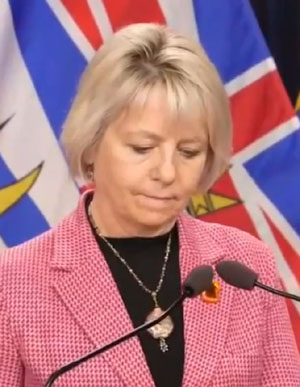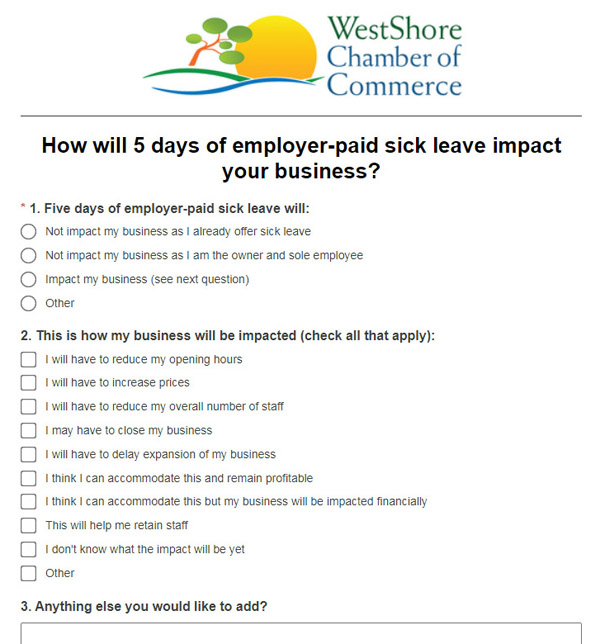
Saturday November 27, 2021 | LANGFORD, BC [Updated December 1, 2021]
News Analysis by Mary P Brooke, Editor | Island Social Trends
Paid sick leave will be standard for workers in British Columbia starting January 1, 2022, with a minimum of five paid sick days each year. Employers are required to underwrite that cost.
The November 24 announcement by Labour Minister Harry Bains highlighted that BC is the first province in Canada to legislate this level of paid time off for workers who become ill. This new workplace protection applies to all workers covered by the Employment Standards Act, including part-time workers.
Bains said that the experience of the COVID pandemic in society and the economy has exposed and amplified the inequities for many demographics including women, marginalized populations, and low-income persons and families. “These are people who can least afford to stay home and lose wages when sick,” said Bains.
“Everyone values safe workplaces. Employers do not want their employees to come to work sick. They have made this point loud and clear,” said Bains. “Paid sick leave is the best way to achieve this.”
“So for the first time ever, we are creating permanent province-wide sick leave. After extensive consultation and with input from many voices we have made a decision. All workers covered by the Employment Standards Act will be entitled to a minimum of five days of employer-paid sick leave each year,” said Bains.
Looking to the future:
“Everyone gets sick from time to time,” said Bains.
“Now we must look to the future,” said Minister Bains in his introduction to media on Wednesday. Workers, employers, community members have shown us this issue is important to them.”
He encouraged the business community to recognize the economic and social benefits of providing paid sick leave. That includes “increased productivity, higher retention, and increased labour force participation, especially for women”.
“Having paid sick leave is good for businesses, good for workers and good for our communities. The economy will recover faster and help businesses retain more workers in a labour shortage environment,” said Bains. Safer and more inclusive workplaces are part the result.
Removing barriers to success “that many workers face every day” is also part of the expected outcome for the provincial government. “It is the right thing to do,” Bains concluded.
“Many of the people who lack paid sick leave are the same workers we depended on most during the pandemic,” said Bains. “Lower-wage workers who help us get our groceries, prepare our food at restaurants and make sure we have the services we need deserve a basic protection like paid sick leave.”
How it works:
Paid sick leave will be standard for workers in British Columbia starting January 1, 2022, with a minimum of five paid sick days each year. Employers are required to underwrite that cost.
The paid sick leave protection will apply to all workers covered by the Employment Standards Act (ESA), including part-time employees. The ESA does not cover federally regulated sectors, self-employed workers and employees in professions and occupations explicitly excluded from the ESA.
In May 2021, amendments to the ESA laid the groundwork for establishing minimum standards for permanent paid sick leave.
The May 2021 amendments also created a temporary COVID-19 paid sick leave program for up to three days of leave, until December 31, 2021. To support businesses that do not already provide paid sick leave, government is reimbursing employers up to $200-a-day per worker, to help cover their employees’ wages for the COVID-19 paid sick leave.
PHO weighs in:
BC Provincial Health Officer Dr Bonnie Henry was part of the November 24 session with Minister Bains, to offer her support and give her thoughts on the government’s decision.
“There have been many many lessons from the COVID-19 pandemic. And one important lesson is that we are all in the same storm but we are not all in the same boat. We have seen that the pandemic has exposed and amplified inequities, and experiences have been quite different for different groups of people.
“We know that women, marginalized populations, lower-income people and racialized people have carried a much heavier burden during this pandemic and we know that economic policies have health impacts, we have seen that. And we have seen that the health of workers impacts our economy,” Dr Henry said.
“We also know, that for some people job security is tenuous and this has increased during the pandemic and we have seen that in many sectors including health-care, food production and many others,” she said.
“Individuals may know the public health advice that we are asking them to do during this time of pandemic. Following that advice and staying home and away from work when they are ill is very challenging. It could mean losing their job or not having stable housing, or not being able to provide food for their families,” said Dr Henry, concluding “these are choices that nobody should have to make”.
When people are ‘forced’ to go to work when ill, the workplace is at risk. “We have seen that too,” said Dr Henry, noting that whole workplaces needed to be shut down, and that colleagues were at risk for themselves or bringing the virus home to their families and spreading that in the community. “And we have seen that far too many times.”
Public engagement:
Over 60,000 workers and employers responded to the government’s public consultation survey as undertaken by the Labour Ministry. “A fair and balanced regulation” was the promised outcome, said Bains.
The Province consulted with workers and employers around BC to find out what currently exists in the way of paid sick leave and to gather feedback on three options: three, five or 10 days of paid sick leave, to come into effect in the new year.
“Not surprisingly, some called for three days or less, while others have asked for 10 days or more,” said Bains, calling five days a sustainable solution, given the challenges faced by many sectors.
Most workplaces that already provide paid sick leave found that most workers take between zero and five days of sick leave each year. Evidently, 98% of employers say there is no abuse of paid sick leave.
[See Backgrounder at the bottom of this article, for more details on the two-phase survey results.]
The COVID-experience:
During a two-month period at the height of the COVID-19 pandemic, workplace outbreaks led to nearly 200 businesses being shut down in the Fraser Health region alone. Workplaces with pre-existing paid sick leave policies saw less workplace transmission.
Presently about one million workers in BC have not had any sick pay leave. “Now 50% of the workforce may use this,” said Bains. He outlined that when the BC Government introduced three days of paid sick leave in May 2021, as directly related to the COVID-19 pandemic.
“This made a big difference to workers who can stay home and get healthy, with peace of mind. To employers, we’re ensuring that the customers and their employees are safe, and the community, by reducing the spread of COVID-19,” said Bains.
WestShore Chamber supports sick leave:
The WestShore Chamber supports paid sick leave for workers, but in a statement to its membership this past week says it “does not support businesses being asked to shoulder this cost at this time”.
“Businesses in BC continue to be impacted by some or all of the following: pandemic impacts, labour shortages, increase in staff and product costs, supply chain disruption and a state of emergency,” said WestShore Chamber of Commerce Executive Director Julie Lawlor.
Lawlor said that BC Chamber of Commerce President and CEO Fiona Famulak summed it up well with this: “While many businesses have been resilient through this pandemic, it doesn’t mean they are thriving. They are emotionally and financially exhausted…today’s announcement is a gut punch to the long-term sustainability and competitiveness of BC businesses.” See the BC Chamber’s full statement on paid sick leave here.
A short anonymous survey seeks input on impacts. Results of the survey will inform the Chamber’s advocacy work with the provincial government.
CFIB weighs in:
The Canadian Federation of Independent Business (CFIB) issued a statement on November 24 saying many small businesses are “still reeling from the pandemic”, claiming that 38 percent are “back to making normal sales”.
CFIB says 64 percent of small businesses are “not supportive of any permanent employer-paid sick leave program”, with 84 percent citing costs as their main concern.
CFIB says in BC the average small business is carrying $129,348 in COVID-19-related debt. The estimate for recovery is given as 21 months. About 35 percent of small businesses are apparently “losing money every day that they are open”.
This view of the immediate perhaps does not allow for the reality that finding and retaining good long-term employees may include offering sick-leave benefits.
Gig economy & self employment:
Work is still underway by the BC Government looking into the possibility of providing sick pay and other benefits to people who earn an income through gig work (contract, freelance, etc) and other types of precarious work. Parliamentary Secretary Adam Walker (MLA for Parksville-Qualicum) is “working to take on those issues”, said Bains.
Part of that work is to learn “what coverage they may have now”, toward everyone having “minimum protection”.
Bains says part of the work will be to determine a process of determining whether a person is an employee or an independent contractor.
Self-employed workers are left out in the cold by this decision. Unless they have disability insurance or some other sort of commercial product to cover time away from work, they have no coverage; this is an expense to any person and their business, only because they choose to work for themselves. This seems like a raw oversight in the overall socially-conscious goal of the government to try and support all people to contribute to society through their work.
Sector input:
The Province looked to other jurisdictions that have mandated paid sick leave, including in the United States, Australia, New Zealand and several European countries. Their experiences have shown the cost increases for most business were less than expected. They also experienced significant benefits, including increased productivity and retention of trained staff, reduced risks of injury, improved morale and increased labour-force participation.
“A workforce is the greatest asset for a business, and paid sick leave helps maintain healthy, efficient workplaces for all,” said Anita Huberman, president and CEO, Surrey Board of Trade. “Not all workers have employers that offer paid sick leave, especially for essential or frontline workers, many of whom are in Surrey. That is why the Surrey Board of Trade supports the five-day option for B.C.”
Sheila Lewis, provincial women’s manager, Métis Nation British Columbia, said: “Paid sick leave will be particularly beneficial to women who are more likely to be balancing work and family responsibilities. Sick leave will help women – especially Indigenous women – reattach to the labour market, providing them more stability and security, while benefiting employers through improved productivity, loyalty and recruitment.”
Backgrounder – Survey Results – Permanent paid sick leave public engagement process
Following the amendments to the Employment Standards Act that laid the groundwork to establish B.C.’s first permanent paid sick leave, a comprehensive public engagement process was undertaken to determine the minimum number of days of sick leave employees will be entitled to.
More than 60,000 responses were received during the public consultation that ran from early August until late October.
In the first phase of consultations, more than 26,000 workers and businesses completed surveys on the current arrangements for paid sick leave, and what is needed.
Highlights from the Phase 1 survey responses:
* Many employees without access to paid sick leave reported regularly going to work sick or returning to work before fully recovering.
* Employers and employees both reported concerns about employees coming to work sick and infecting others.
* Approximately 60% of employers do not offer employer-paid sick leave to any of their employees.
* Of the employers that offer paid sick leave to their employees:
* Nearly 45% provide three to five days a year
* About 25% provide six to 10 days
* About 20% provide more than 10 days
* Nearly 10% provide less than three days
* Of those who have access to employer-paid sick leave, about 70% indicated they typically do not use all of the paid sick days they get each year.
In the second phase, informed by the surveys, three options were developed for the minimum entitlement: three, five or 10 days: 33,975 workers and businesses provided feedback.
Highlights from the Phase 2 options responses:
* Support for the three options – either strongly favoured or somewhat favoured:
* Option 1 (three days) – 64% of workers; 44% of employers
* Option 2 (five days) – 75% of workers; 28% of employers
* Option 3 (10 days) – 81% of workers; 19% of employers








